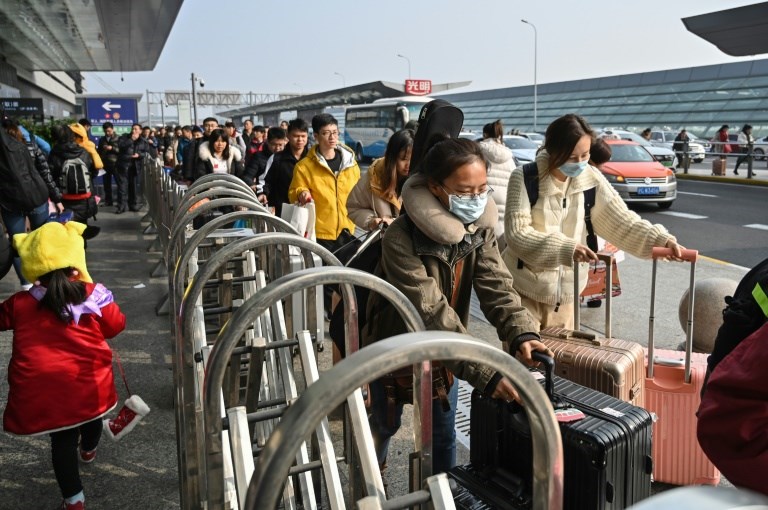An outbreak of a mysterious virus has not deterred millions of people in China from packing into crowded trains as they head home for the Lunar New Year -- but some are donning masks as a precaution.
The world's biggest annual travel rush comes as a SARS-like coronavirus has spread from the central city of Wuhan to Beijing, southern Guangdong province and three Asian countries, with more than 200 people stricken, including three fatalities.
A renowned government expert on Monday said the virus is contagious between humans, which would raise the risk of more people getting sick as they sit next to each other on long rides to their hometowns.
But going back to the countryside or other parts of the country to gather with family is an annual ritual that is impossible to miss -- the country will come to a halt from Friday until Thursday next week to celebrate the Year of the Rat's arrival.
More than 100 million train trips have already been taken since the mass migration began about 10 days ago, the national railway operator said Sunday.
Lines formed on Monday at ticket booths outside Beijing Railway Station, where commuters -- young and old -- gathered with their luggage and souvenirs.
Li Yang, 28, an account manager from northern Inner Mongolia region, said it had been five to six years since she returned to her hometown from Beijing.
"It's hard to guard against such viruses," she told AFP.
"Watching the news, I do feel a little worried. But I haven't taken precautionary measures beyond wearing regular masks," she added. "Even if I remained in Beijing, I would have to visit public spaces."
A worker in the finance sector surnamed Guo added that she and her friends had been reminding each other to wear masks as a precaution.
"We're not sure how else we can protect ourselves, but I am generally vigilant," said the 26-year-old. "What else can we do? We still have to go home over the Spring Festival."
President Xi Jinping weighed in on Monday, instructing authorities to contain the spread of the virus, release information on the epidemic "in a timely manner", and "ensure that the masses have a stable and peaceful Spring Festival".
- 'Avoid public places' -
The new coronavirus has caused alarm because of its connection to Severe Acute Respiratory Syndrome (SARS), which killed nearly 650 people across mainland China and Hong Kong in 2002-2003.
Authorities in Wuhan, a city of 11 million people that also serves as a major transport hub, said Monday a third person was confirmed to have died and 136 new cases were found over the weekend.
A Wuhan seafood market is believed to be the epicentre of the virus, and the World Health Organization said an animal source seemed most likely to be the "primary" culprit.
In Hong Kong, 106 people were being monitored. Authorities kept a close eye on developments -- especially given the proximity of Guangdong to the densely packed financial hub.
Passengers arriving at the city's airport and high-speed train terminals have been subject to increased monitoring, including temperature checks.
Health officials said Monday they were expanding their enhanced checks to include anyone coming in from Hubei province, not just Wuhan. All passengers flying in from Wuhan will also be asked to fill out a health declaration form.
At Shanghai's busy Hongqiao Railway Station, some in the crowd wore masks, but not significantly more than usually seen in the eastern city. No flu screening stations or signs were visible.
A 25-year-old woman surnamed Jiang, who works for a medical device company, was heading to her hometown in Hubei, the province where Wuhan is located.
"Previously, I had many plans in Wuhan, like hanging around for one to two days. But now I think I will just transfer there instead of staying," she said.
A woman surnamed Xia, a 29-year-old auto industry employee, was wearing a mask because she was heading home to Wuhan.
She said one cousin who lives in southern China was "very worried" about the virus and "doesn't dare go back to Wuhan".
"I think the pneumonia situation is controllable," Xia said. "But after I go home, I'll avoid public places, seafood and live poultry."



